Related Research Articles
The New Wave was a science fiction style of the 1960s and 1970s, characterized by a great degree of experimentation with the form and content of stories, greater imitation of the styles of non-science fiction literature, and an emphasis on the psychological and social sciences as opposed to the physical sciences. New Wave authors often considered themselves as part of the modernist tradition of fiction, and the New Wave was conceived as a deliberate change from the traditions of the science fiction characteristic of pulp magazines, which many of the writers involved considered irrelevant or unambitious.
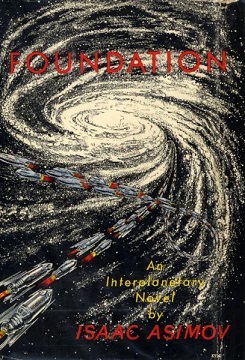
The Foundation series is a science fiction book series written by American author Isaac Asimov. First published as a series of short stories and novellas in 1942–50, and subsequently in three collections in 1951–53, for nearly thirty years the series was a trilogy: Foundation (1951); Foundation and Empire (1952); and Second Foundation (1953). It won the one-time Hugo Award for "Best All-Time Series" in 1966. Asimov later added new volumes, with two sequels: Foundation's Edge (1982) and Foundation and Earth (1986), and two prequels: Prelude to Foundation (1988) and Forward the Foundation (1993).

The Dosadi Experiment is a 1977 science fiction novel by American writer Frank Herbert. It is the second full-length novel set in the ConSentiency universe established by Herbert in his short stories "A Matter of Traces" and "The Tactful Saboteur", and continued in his novel Whipping Star. It was first published as a four-part serial in Galaxy Science Fiction magazine from May to August, 1977.

Life, the Universe and Everything is the third book in the six-volume Hitchhiker's Guide to the Galaxy science fiction "trilogy of five books" by British writer Douglas Adams. The title refers to the Answer to Life, the Universe, and Everything.

The Restaurant at the End of the Universe is the second book in the Hitchhiker's Guide to the Galaxy comedy science fiction "trilogy" by Douglas Adams, and is a sequel. It was originally published by Pan Books as a paperback in 1980. The book was inspired by the song "Grand Hotel" by British rock band Procol Harum. The book title refers to Milliways, the Restaurant at the End of the Universe, one of the settings of the book. Elements of it are adapted from the radio series, primarily the Secondary Phase, although Milliways itself, Arthur and Ford's final fate come from Fits the Fifth and Sixth of the Primary Phase.

The Currents of Space is a science fiction novel by the American writer Isaac Asimov, published in 1952. It is the second of three books labeled the Galactic Empire series, but it was the last of the three to be written. Each occurs after humans have settled many worlds in the galaxy, after the second wave of colonization that went beyond the Spacer worlds, and before the era of decline that was the setting for the original Foundation series.

Against the Fall of Night is a science fiction novel by British writer Arthur C. Clarke. Originally appearing as a novella in the November 1948 issue of the magazine Startling Stories, it was revised and expanded in 1951 and published in book form in 1953 by Gnome Press. It was later expanded and revised again and published in 1956 as The City and the Stars. A later edition includes another of Clarke's early works and is titled The Lion of Comarre and Against the Fall of Night. In 1990, with Clarke's approval, Gregory Benford wrote a sequel titled Beyond the Fall of Night, which continues the story arc of the 1953 novel. It is generally printed with the original novel as a single volume.

James Henry Schmitz was an American science fiction writer born in Hamburg, Germany of American parents.

A World Out of Time is a science fiction novel by Larry Niven and published in 1976. It is set outside the Known Space universe of many of Niven's stories, but is otherwise fairly representative of his 1970s hard science fiction novels. The main part of the novel was originally serialized in Galaxy magazine as "Children of the State"; another part was originally published as the short story "Rammer". A World Out of Time placed fifth in the annual Locus Poll in 1977.

The Glory That Was is a science fiction novel by American writer L. Sprague de Camp. It was first published in the science fiction magazine Startling Stories for April, 1952, and subsequently published in book form in hardcover by Avalon Books in 1960 and in paperback by Paperback Library in March 1971. It has since been reprinted in paperback by Ace Books in July 1979 and Baen Books in April 1992, and in trade paperback by Phoenix Pick in September 2014. An E-book edition was published by Gollancz's SF Gateway imprint on September 29, 2011 as part of a general release of de Camp's works in electronic form; a second e-book edition was issued by Phoenix Pick in September 2014. The book has also been translated into Italian, German and Greek.
Robert Shirley Richardson was an American astronomer, born in Kokomo, Indiana. He also published science fiction using the pseudonym Philip Latham.

"Sidewise in Time" is a science fiction short story by American writer Murray Leinster that was first published in the June 1934 issue of Astounding Stories. "Sidewise in Time" served as the title story for Leinster's second story collection in 1950.
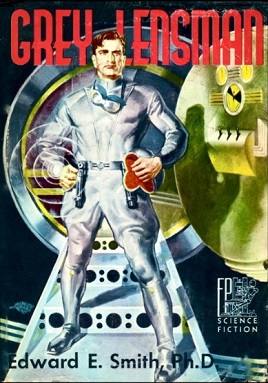
Grey Lensman is a science fiction novel by American writer E. E. Smith. It was first published in book form in 1951 by Fantasy Press in an edition of 5,096 copies. The novel was originally serialized in the magazine Astounding in 1939. Grey Lensman is the fourth book in the Lensman series and the second to focus on the adventures of Lensman Kimball Kinnison.
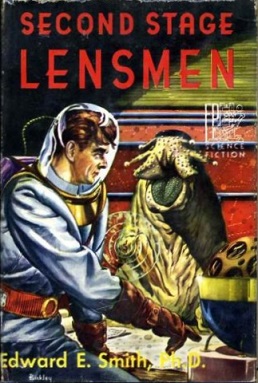
Second Stage Lensmen is a science fiction novel by author Edward E. Smith. It was first published in book form in 1953 by Fantasy Press in an edition of 4,934 copies. The novel was originally serialized in the magazine Astounding beginning in 1941. Second Stage Lensmen is the fifth volume in the Lensman series, and the last to feature Kimball Kinnison as the most powerful Lensman in the service of the Galactic Patrol. Second Stage Lensmen also features the first female Lensman, Clarissa MacDougall. The story mainly focuses upon the exploits of the "Second Stage" Lensmen: those who have gone through the advanced Arisian training Kinnison underwent in Galactic Patrol. These four superior Lensmen, Kinnison, Worsel, Tregonsee, and Nadreck, are armed with mental powers allowing them to control the minds of others and see, hear, and feel without using their physical senses. This elite cadre allows Civilization to tip the balance against Boskone as Second Stage Lensmen abilities are ideally suited to spying and information gathering.

Destination: Universe! is the second collection of science fiction short stories by Canadian-American writer A. E. van Vogt. It was published in hardcover by Pellegrini & Cudahy in 1952, and repeatedly reprinted in paperback, by three different publishers, over the next 25 years. The first British edition appeared in 1953, followed by several paperback reprints. A French translation, Destination Univers, was issued in 1973 and reprinted six times over the next 25 years. The collection has also been translated into Swedish, Portuguese, and Romanian.

Time Is the Simplest Thing is a science fiction novel by Clifford D. Simak, first published in 1961. The story combines paranormal abilities with themes of space and time travel. The underlying theme is intolerance of ordinary people towards those with unusual abilities.
"Vaster than Empires and More Slow" is a science fiction story by American author Ursula K. Le Guin, first published in the collection New Dimensions 1, edited by Robert Silverberg. It is set in the fictional Hainish universe, where Earth is a member of an interstellar "League of Worlds". The anthology was released in United States in 1971, by Doubleday Books.
"The Sound" is a science fiction short story by Canadian American writer A. E. van Vogt, originally published in Astounding in February 1950.
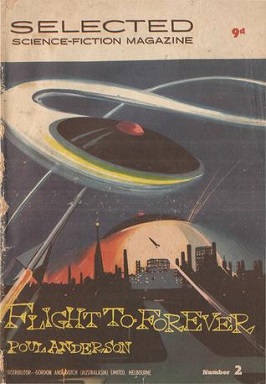
Flight to Forever is a science fiction novella by American writer Poul Anderson, first published in serial form in Super Science Stories in November 1950, and then published again in paperback in 1955. This is one of many science fiction works written during the 1950s that involved time travel.
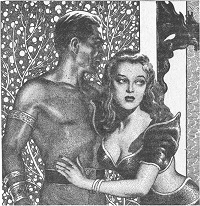
"Cornzan the Mighty" is a classic science fiction story by L. Sprague de Camp. It was first published under the variant title "Cornzan, the Mighty" in the magazine Future Science Fiction for December, 1955. All later appearances omit the comma. It first appeared in book form in the collection A Gun for Dinosaur and Other Imaginative Tales. The story has been translated into German.
References
- ↑ "Destination, Universe!". Galaxy Science Fiction. July 1952. pp. 105–106. ISBN 9781944409074.